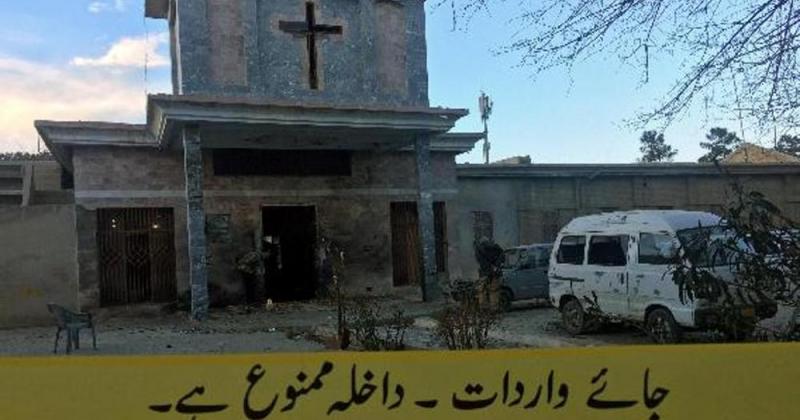The attack in a Methodist church of Quetta shocks the faithful in the “Land of the Pure”, which celebrate the Year of the Eucharist. While Isis is proselytizing in Lahore, the government remains weak.
This year, pain marks Jesus’ feast in Christian Pakistan. Only faith can avoid despair and help to recognize the hand of divine Providence on one’s own story. A suicide bomb attack, claimed by the Islamic State, struck the Methodist Christian church Bethel Memorial in Quetta, in the province of Beluchistan, causing 13 deaths and leaving 56 injured. Four attackers broke into the church, packed with more than 400 faithful gathered for the Sunday liturgy. The terrorists were equipped with explosive vests and armed to the teeth. One blew himself up, another was hit and killed by security officers, two others managed to escape.
Archbishop Joseph Arshad, just nominated to lead the community of Islamabad, notes that “these massacres are increasing in Pakistan. Let us pray to our Lord Jesus Christ that he may grant us strength, wisdom, tolerance and peace. May God give strength to the families of the victims to endure the loss of their loved ones. The attack arrives while Catholics live the Year of the Eucharist which, Arshad says, “helps every baptized person to face difficult challenges and to live the faith with Eucharistic spirit, that is, the unconditional gift of oneself, until the sacrifice of one’s own life”.
Dominican James Channan, director of the Dominican Peace Center in Lahore, committed to promoting inter-religious dialogue tells Vatican Insider, “It is an attack that strikes at heart of the Christian community as it prepares to celebrate Christmas. It is an attack that wants to destroy the coexistence and effort of so many who, at all levels, commit themselves every day to building a better nation. The condemnation is firm and unanimous, according to all those who, in every religious community, promote peace, social harmony and peaceful coexistence. Terrorism continues to strike, but we trust in the country’s healthy forces: government institutions, civil society, religious leaders of good will”. And adds, “We will remember the victims in our pre-Christmas interfaith meeting on 21 December at our Peace Center. The government usually organizes meetings to celebrate Christmas and greet Christian leaders. This year, all the celebrations will be stained by this gratuitous and destructive violence: it is urgent to protect minorities in order to protect pluralism in the country,” Channan said.
Only a few days ago the Catholic Minister for Human Rights and Minorities, Punjab, Khalil Tahir Sandhu, had urged the police institutions throughout the country to “ensure the protection of all churches during Christmas time Masses”, in order to “protect the faithful so that the Christian community can happily celebrate this central event for the faith”. The minister did so, because the most painful precedents are still carved in the memory of the Pakistani faithful (about 4 million in a population of almost 200 million): the attack carried out by two suicide bombers in an Anglican church of Peshawar in September 2013 (more than one hundred dead people); and the suicide attack on two churches in Lahore, one Catholic and one Anglican, in March 2015. Without forgetting the “Easter massacre”, when in 2016 a bomb exploded in a park attended by Christians who were peacefully celebrating the resurrection of Christ, after Sunday Mass.
“Terrorism becomes fiercer during religious holidays with the idea of massacring innocent people. It’s terrible and inhumane, “commented to Vatican Insider Shafaat Rasol, a well-known Muslim Sufian preacher, leader of the Islamic district of Markiz Bilal, in Lahore, which includes a mosque, a madrasa and a cultural center. It is an abhorrent act - he points out - that violates human life and profanes the name of God. We are deeply close to our Christian brothers and sisters today, at this moment of pain. We will unite in solidarity and prayer. These events give us even more strength and willingness to work for inter-religious dialogue, to build in society a mentality and a culture of peace, starting with young people. We feel all the more called to promote values of profound respect for the faith of others, for the dignity of every person, for welcoming others. The path of peace and coexistence is fraught with obstacles and there are forces that oppose it; but precisely for this reason we must remain and resist united, Muslims and Christians, alongside all men of good will”.
Christmas is a feast very much felt by Pakistani Christians. In all the large cities and where there are settlements with a Christian majority (so-called “colonies”), the communities of the faithful decorate and illuminate churches, houses and streets. The Christian churches - five main confessions in Pakistan – organize novenas, representations of the Nativity, traditional Christmas carols, interfaith meetings. Without forgetting the charitable gestures that Christians promote, such as assistance to orphans and widows of all religions.
By a curious coincidence, December 25th is a public holiday in Pakistan: not so much because of the Christian festivities (the Christian ones are not civil holidays) but because it is the birthday of Muhammed Ali Jinnah, the founder of Pakistan.
Security services are thus strengthened on these occasions, precisely because of fear of terrorist attacks. Since 2001, the government has required churches in Pakistan to equip, at their own expense, with perimetral walls, surveillance cameras, checkpoints and security services. On special holidays, such as Christmas and Easter, police officers are also available to strengthen security. Recent news of a propaganda and recruitment campaign launched by the Islamic State in Lahore, with leaflets on the streets, can only confirm the alarm, especially among religious minorities.
